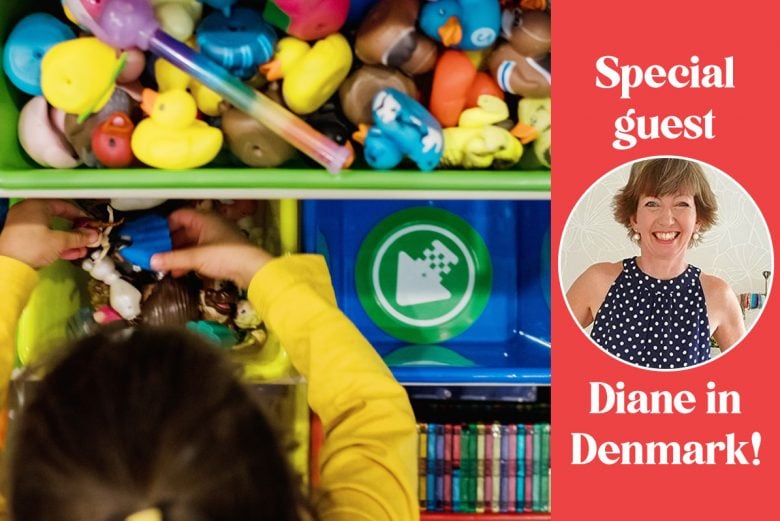
How to help them take ownership of the right spaces
Your More Serious Type 4 Child may be the tidiest—or the messiest. How do you support their natural ability to create order in their world?
In this episode, Carol and Anne are joined by Diane in Denmark for the final episode in this series of life and space organization for all 4 Types. Listen for tips that will help your More Serious Child find both inner and outer balance.
This episode’s Parenting Practice
Consider where your Type 4 child is living their all-or-nothing nature in their life routines and organization. Listen to this episode and notice which one really speaks to you and gets your attention. Put that tip into practice.
(Bonus practice: Apologies and accountability go a long way with a Type 4 child. If you find a mistake you’ve made by listening to this podcast say, “I’m learning some things and I’d like to approach it differently, and to have a conversation about it.” Treat them they are the more serious child. They can have a more adult-like conversations with you even as a 8-year-old. Involve them in what you’re putting into practice this week.)
Transcript of podcast episode
Carol: Welcome to The Child Whisperer Podcast. I’m your host, Carol Tuttle, author of the best-selling parenting book, The Child Whisperer. I’m with my co-host, Anne Tuttle Brown. Welcome to the fifth podcast to wrap up this series about life and space organization tips for each Type child. Today we’re talking about the Type 4 child. I’ve got my co-host here, Anne Tuttle Brown along with our life and space organization expert and coach, Diane in Denmark. And you can find Diane on YouTube, on Instagram. She’s got tens of thousands of followers and she actually became an expert out of her own seeking to support herself. I think that’s fair to say, Diane, that you wanted to find methods, systems, routines that would support you in running your household and supporting your family, and just what the things that keep us… I’m a real believer, if our space is organized, the things we own are organized, and we live in a tidy space, we’re more free. We just feel better, we feel differently, very supportive.
Anne: Well, it kind of follows the same pattern as Dressing Your Truth. When you’re dressing in organized and orderly with who you are, you feel better.
Carol: Right. True to who you are.
Anne: Same with your house, right?
Carol: Yeah. So the Type 4 child is who we’re talking about in this last of the series. The Type 4 child is, as I’ve referred to them in The Child Whisperer book, the More Serious Child. They have a straightforward movement that naturally creates structure and balance yet they need to be their own authority in creating this. So I think it’s a default for parents to think, well, this child should be very organized just effortlessly, you know, and often they are yet they are not necessarily developing that tendency if not given the support to. So that’s why we’re going to look at some unique challenges that they face due to the fact that they have to be in an environment where that can be nurtured and developed. Again, we don’t always live true to our nature when we are in an environment… You know, quite often we can’t develop who we are and the skills that we have that are effortless, natural gifts, and talents when the environment isn’t supporting that. So environment is going to be a crucial factor here and…
Anne: I have seen a Type 4 on the show Hoarders. So it is possible to have a Type 4.
Carol: Yeah. No, no. All or nothing is very much point out here. That’s what we’re going to talk about.
Diane: Yeah. I have Type 4 child and they’re all or nothing. And I’m a Secondary 4. I’m a Type 1, Secondary 4 so I can understand all of that.
Carol: Yeah. And as a Secondary 4 as well, they like to take over a lot in this place.
Anne: Especially in this place, right?
Carol: It has a strong opinion about how everything should be organized in my world and I’m like, “Well…” So the lack of motivation to follow through on space management tasks when they do not feel they are their own authority because they’re being…
Anne: Dictated to.
Carol: …dictated to, told what to do over and over.
Anne: Okay. So we’ve been talking for the different Types of children storage, routines. Storage for Type 4, you obviously want to have something that’s very clearly defined, preferably behind closed doors. They like things boxed, compartmentalized, covered drawers, and perhaps they will enjoy some color-coded system. That’s often worked for my child. And you have to remember here, with the Type 4 child that they are very private, that they have that ownership of things. If you can give them, as we were talking about for the Type 2 child, a couple of boxes, some storage area, it is strictly off limits to the rest of the family including Mom and Dad, something that they can really have as their own private place where nobody else is going to look, nobody else is going to declutter things obviously. It is very, very important for them to be in charge of their own space and also keep things very defined, you know. Their storage space is very separate from the bed area, you know, keep the floor clean. They see their room as areas as different areas that they can work on.
Carol: Well, that’s how their brain thinks in these sections. And I personally knowing what I know now, taking a Type 4 child to like a container store of some kind or… They like to create efficiency. That’s one of their gifts. They like to figure out, how can I make this more efficient. So rather than I would let them pick the supplies they need and say, “Okay. What do you need? Okay.” And I would say to them, “Okay. Figure out an efficient way to keep your room organized, figure it out.”
Diane: Yeah. The only problem is…
Anne: And then follow up with them or…
Carol: Yeah, yeah. “And when you’ve got that in play, I want you to share with me what you’ve come up with.”
Diane: Yeah. The problem for them comes with the management of those areas because it’s the all-or-nothing thing. They can have everything put away in its little compartment, and then they have a time for things are left out, and it’s like the magnet, you know, you leave one thing out and then it’s a magnet, and then things start building up. And then that’s when the overwhelm comes in for them. And that’s when you really need to step in and teach them how to manage their space, that they need to have… You know, they thrive on routines, but again, you know, we can talk about routines right away. Don’t allow… You know, allow the child to come up with their own routine because they have their own movement, what feels natural for them. So the Type 4 will want to write down every single detail of that routine, and then when they don’t achieve it that’s when they start, you know, beating themselves up or they just kind of throw it out of the window. So you’ve got to go for that kind of happy medium of allowing them to have, you know, this routine, but don’t make it too detailed or get too much into, you know, 15 different things they have to do before they go to bed. Just, you know, keep it as simple as you can and… Sorry, Carol. You go on.
Carol: Well, with that all-or-nothing approach to life where they get out of balance as you’ve mentioned and then they have no motivation to follow through or they just have too much to deal with, I find they also… One of the defaults is they start to order everybody else around.
Diane: Yes. Oh, I’ve been told that many times. I have a Type 4 child. That’s the thing that you… You’ve got to help them here to show that, you know, they’re in charge of their little space. They don’t need to be in charge of their sibling’s space or what they do with their toys, you know. We’ve talked about in this podcast series, each child is very different, you know. Some children like the open storage, some will have a connection to the toys, others just want to, you know, throw everything in a box. Type 4s, you know, we expect you to manage your own space, your own room, but you’re not managing the rest of the house, you know. They don’t have to have to carry that responsibility with them.
Carol: You may find now if you’re a parent that you’re not implementing these house rules and the things that Diane taught in the first podcast, and you have a messy place, and they do have a cleaner room, they’re going to spend more time in their room. They are going to want to…
Diane: Oh. They spend more time in their room anyway, don’t they? Type 4.
Carol: Yeah. They want too many, but that’s going to even be more the case because they just are overwhelmed with how much stuff is around, out and around.
Diane: Yeah. When things are going on that, they will retreat to their space.
Carol: Because there’s no order in the rest of the home.
Diane: Yeah. And especially if you’ve got siblings you’re sharing a room, you really need think about that giving the Type 4 child a very, you know, even draw a line with chalk on the floor in the room saying, you know, this… So it’s very defined of, you know, for everything.
Carol: I would even put… I mean, visually it’s hard on a Type 4. So I would even go as far as put up a divider or something, you know, foldable screen because of that you… Visually it’s very challenging for a Type 4 to see the disorder and it’s stressful for them. So again…
Diane: Yeah. So that’s not to say that they can’t get disorderly themselves.
Carol: No, that’s true.
Diane: You know, you just…
Carol: I found my Type 4 son, his bedroom, he’s a minimalist. I mean, he just doesn’t have a lot of stuff and he’ll keep things forever. He has the same pair of slippers he had when he was single. I mean, I’m like, “How long have you had those?” And he’s just like, “Well, it still works. They’re fine.” Because it’s not where he wants to put his money. He wants to put it into mountain bikes and gear, and things that he really values. So it’s been interesting to see that was he super immaculate. His room was never messy because he never had much stuff, but he wasn’t super immaculate about it. Now, as a homeowner, that young man has the most immaculate lawn, you know, the edges on it, everything about that lawn.
Anne: Well, even when he was younger like, yeah, he just, like, little disgruntled, maybe the bed wasn’t made or a few things are flipped.
Carol: Yeah, yeah. It didn’t matter to him.
Anne: It wasn’t like a bomb went off.
Carol: No.
Anne: But his snowboard, his prized possessions were in pristine condition.
Carol: Yes, and you don’t touch them and you don’t ask to borrow them. And so you’ve got to recognize that, too. Not everything in their world is going to be held at this high standard of taking care of it. So what are the things that they prize and feel the most value for, they will develop their ability to be very, you know, they really take care of something at a high level. But then the other things, the standard goes down, but they don’t get to just ignore it.
Diane: No. You’re talking about for the, you know, hygiene and we’ve talked about that with the other children, you really have to say, okay, that there are some things where they are their own authority, they don’t want, you know, these rules imposed on them, but there are some things that just have to take place, you know, like tooth brushing. And I think I heard in one of the other Child Whisperer podcasts where quite often a child, Type 4 child, you would imagine that they would be so perfect in going through everything. But actually they can be one of the ones that easily can go for days without brushing their teeth and you have to say something, you know, “We have these house rules and just as a human being you’ve got to be, you know, washing yourself every day.” That’s not something that they can be in charge of themselves. It’s just something that they have to do.
Anne: There’s an interesting phenomenon I find with the Type 4 is they can get so hyper-focused in their mind that they forget the little things. They kind of become aloof to little things that are going on because their focus is so much more big picture or far out, you know.
Carol: Hold that thought. Let’s continue this discussion after a short break.
Female: What’s your mom uniform? Yoga pants? Jeans, and a t-shirt? As a mom, you’re busy and wardrobe isn’t high on the priority list. But do you ever get tired of feeling blah about how you look? Carol Tuttle’s Dressing Your Truth program helps you create a personal style that works for you, for your budget, for your family, and for your life. You can look more pulled together in less time. All you need is a little know how and Carol can show you. Just sign up for a free account at dressingyourtruth.com.
Carol: We kind of talked about this challenge. Let’s see if you have any more thoughts on it that they prefer efficiency, order, and minimal. They have that as their nature yet when they own too many belonging, share a room with an untidy siblings as we’ve mentioned and talked about or the main household spaces disorderly, they are not able to develop traits and skills to use these gifts in their space management. So don’t just assume a child has this skill set. They are inclined to have the ability to develop them easily because that is in their nature and how their energy moves, but don’t assume a child if they’re… As a Type 4 child they should just be able to put, you know, these skills come, you know, they have to be taught like you’ve said.
Diane: It depends where their focus is at the moment because of course, they can have weeks and weeks of being very focused on keeping their room orderly, they’ve got all their supplies, everything. But if for example something comes up like school assignment, they can sweep everything else to the side and purely focusing on that. So that’s where you need to and as a parent step in and say, “Well, you know, you also have your kind of simple daily routine, you need to, you know, change clothes, be washing, tidy up your room,” because they have the all or nothing approach. If something interesting or important comes up, they will push what is not so interesting at the time to the side. And that’s why it’s important to have the, you know, the daily routine going. That’s just something… It’s not up for discussion. It’s just… And its life skills that they’re going to…
Carol: And they are the ones you can reason with.
Diane: Yes. They were those…
Carol: When it seems rational they, “Okay. That makes sense,” you know, like, “Sure.”
Diane: Yeah. And then there are just some things that are not up for discussion. You must do something.
Carol: And then talk to them. They’re the More Serious Child. Talk to them like an adult.
Anne: And maybe having a better understanding of, “Okay, what are the consequences of not brushing your teeth?” Pull up a dental book and show them that’s the risk, you know.
Carol: That’s right. You will get decay and now, and I’m going to have you pay for your cavities, and, you know. So…
Anne: Yeah. Show them the big picture here.
Carol: The cost and effect of this choice.
Diane: It helps them through getting those routines done because, you know, obviously they want to get on to studying, they love studying, they love acquiring the knowledge. You know, the timer is really good for Type 4s because they have the all or nothing approach. Also when they’re doing school work, set the timer and say, “Okay. You can sit and work on your school work for 15 minutes, 30 minutes.” But also your Type 4 child, show them the importance of setting a timer and taking a break because they will…
Carol: Yeah. To go to the bathroom.
Anne: Get some food, eat.
Carol: Take a shower.
Diane: Yeah. And they will understand, you know, as they get older that, you know, their brain function is better when they’ve had, you know, a break, you know, a cup of coffee to wake them up or whatever it is. But the importance of using a timer so they don’t get stuck in whatever it is they’re doing, whether it’s studying, or cleaning, or doing chores.
Anne: I like that. Rather than using the timer to, you know, get the task done, this a timer to break away from the task in a way. I really like it.
Diane: Yup, yup. Because they can get completely broke down in their own, whatever they’re doing, you know, it’s really difficult for them to come out again.
Carol: Well, the last thing I want to mention on the other side of that is the very Type 4 child that has a high functioning ability that is your one that follows through, the responsible one, they do what they’re asked. They think, “Well, we have these rules. Of course, we keep them.” They follow the rules, they keep their space clean. A lot of times they’ll feel frustrated because there’s not a fairness because the kids that are getting more attention or more leeway in getting out of things are the ones that the parents are having more difficulties with that are other Types. And I’ve heard this as a…just the feedback that I received from Type 4 adults in our community said, they feel they weren’t acknowledged enough and they weren’t given that kind of…they were kind of left to themselves because they were so good at what they did. The parents take it for granted in some ways and then they noticed how unfair the system worked. And then well, fairness is… Especially if you have a 4/2 or a 2/4 because they’re processing and aware of every little thing going on in the family system, and they will lose respect for you as the parent and an authority in the household if there isn’t really a reasonable fairness practiced with the children, dealing out consequences and staying true to what the rules are. And everybody has to then follow them, you know. They’ll notice all that.
Diane: Yeah. And I’ve told you this before, Carol, that I’m a child 1/4. I have a child who’s a 2, sorry, a 1/2 and a 4/2, and my 4/2 child, often I feel like I am the child in that situation, you know, they are very much the grown up. And also as a Type 1, you know, my child will go through their routines, for example, going to bed at night. And I know you’ve mentioned this on another podcast where your Type 4 child will just go off and do their, you know, bedtime routine.
Carol: Yeah. It’s time for bed. I’m tired, I’ll go to bed.
Diane: Right. And I’ll be like, “Where have they gone?” And, you know, “I didn’t even give them a hug.” And, you know, I go in later and say, you know, good night. So the Type 4 children, of course, they will go off and do these things on their own. As a parent you need to remember to go in and, you know, say, “Well done.”
Carol: Right, right. That’s so true. I’m more often was saying good night to Mark and he was already in bed.
Diane: Yeah. Well, that’s the thing.
Carol: I didn’t have to tell him to go to bed. That’s a really good point and then you wouldn’t lose that connection time, and time for acknowledgment. So making… Yeah.
Diane: So you need to really… Or if you’ve missed the boat and they’re already asleep, you know, the next morning say, “Well,” you know, “Well done. You did a great job of going through with your routine and everything was done,” and, you know, give them an extra hug, you know, they really appreciate hugs so much as the other Types. But just remember to follow through and often the Type 4 child, they would do the things off their own back, you know. You don’t need for checking up on them, they were already done.
Carol: Yeah. I love that. Well, I love this. Anne’s got notes all over her…
Anne: I do. From every podcast.
Carol: She’s putting things to practice here. So we want you to put this into practice. If you have a Type 4 child, which of these tips that you really spoke to you today that really got your attention, that you’re motivated to put into practice, and involve them, and said, “Hey, I’ve…” You know, for me, knowing and understanding a Type 4 nature, I would say, “I listened to this podcast.” And apologies go a long way with and ownership and accountability with a Type 4 child. And say, “I’m learning some things and I’d like to approach it differently, and to have a conversation about it.” Treat them they are the more serious child. They can have a more adult-like conversations with you even as a 8-year-old, you know, they’re able to have dialogue about things. So involve them from the go and putting what you’re going to practice this week. And it’s just been such a treat to have Diane with us. As, you know, she’s in Denmark in a whole other time zone and we’ve recorded these just on the same, you know, you’re getting them spaced out. But I’m sure, you know, we recorded them at the same time and she’s just been several hours with that. And you’re your own treasure, Diane. You’re just really remarkable human being. I just think your Type 1 really shines through and you’re really true to yourself, and I appreciate that because you’ve touched a lot lights just because you’re you, you know, and being true to yourself. So…
Diane: Thanks for having me. I love it.
Carol: You’re welcome. Thank you and we’re excited to hear about your results from listening to this podcast in The Child Whisperer Facebook group. Thank you, Anne, as well. Thanks for listening. For more support, go to thechildwhisperer.com where you can purchase the book, subscribe to our weekly parenting practice email, and find a transcription and audio of, “The Child Whisperer” podcast.
Anne: If you’re listening on iTunes, thank you for leaving a review. If you have a parenting question, please send it to [email protected].



